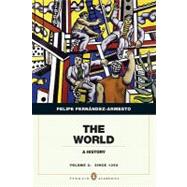
Felipe Fernández-Armesto holds the William P. Reynolds Chair of History at the University of Notre Dame. He has master’s and doctoral degrees from the University of Oxford, where he spent most of his teaching career, before taking up the Chair of Global Environmental History at Queen Mary College, University of London, in 2000, and the Prince of Asturias Chair at Tufts University (2005—2009).He is on the editorial boards of the History of Cartography for the University of Chicago Press, Studies in Overseas History (Leiden University), Comparative Studies in Society and History, Journeys, and Journal of Global History. Recent awards include the World History Association Book Prize (2007), Spain’s Premio Nacional de Gastronomía(2005, for his work on the history of food), and the PremioNacional de Investigación (Sociedad Geográfica Española,2004). He has had many distinguished visiting appointments, including a Fellowship of the Netherlands Institute of Advanced Study in the Humanities and Social Sciences and aUnion Pacific Visiting Professorship at the University of Minnesota. He won the Caird Medal of the National Maritime Museum in 1995 and the John Carter Brown Medal in 1999 and has honorary doctorates from La Trobe University and the Universidad de los Andes. He has served on the Council of the Hakluyt Society, on the Committee of English PEN, and as Chairman of the PEN Literary Foundation.
His work in journalism includes regular columns in the British and Spanish press, and, among his many contributions
to broadcasting, he is the longest-serving presenter of BBC radio’s flagship current affairs program, Analysis. He has
been short-listed for the most valuable literary prize in the United Kingdom.
Fernández-Armesto is the author, coauthor, or editor of 30 books and numerous papers and scholarly articles. His
work has been translated into 25 languages. His books include Before Columbus; The Times Illustrated History of
Europe; Columbus; Millennium: A History of the Last Thousand Years (the subject of a ten-part series on CNN);
Civilizations: Culture, Ambition, and the Transformation of Nature; Near a Thousand Tables; The Americas; Humankind:
A Brief History; Ideas that Changed the World; The Times Atlas of World Exploration; The Times Guide to the Peoples of
Europe; Amerigo: The Man Who Gave His Name to America; and Pathfinders: A Global History of Exploration.
Brief Contents
Contents
Maps
Special Features
Getting the Most Out of the Maps in The World
About Felipe Fernández-Armesto
From the Author to the Reader
Introducing The World
Acknowledgments
A Note on Dates and Spelling
Part 6: The Crucible: The Eurasian Crises of the Thirteenth and Fourteenth Centuries
Chapter 13: The World the Mongols Made
Chapter 14: The Revenge of Nature: Plague, Cold, and the Limits of Disaster in the Fourteenth Century
Chapter 15: Expanding Worlds: Recovery in the Late Fourteenth and Fifteenth Centuries
Part 7: Convergence and Divergence, to ca. 1700
Chapter 16: Imperial Arenas: New Empires in the Sixteenth and Seventeenth Centuries
Chapter 17: The Ecological Revolution of the Sixteenth and Seventeenth Centuries
Chapter 18: Mental Revolutions: Religion and Science in the Sixteenth and Seventeenth Centuries
Chapter 19: States and Societies: Political and Social Change in the Sixteenth and Seventeenth Centuries
Part 8: Global Enlightenments, 1700—1800
Chapter 20: Driven by Growth: The Global Economy in the Eighteenth Century
Chapter 21: The Age of Global Interaction: Expansion and Intersection of Eighteenth-Century Empires
Chapter 22:The Exchange of Enlightenments: Eighteenth-Century Thought
Part 9: The Frustrations of Progress, to ca. 1900
Chapter 23: Replacing Muscle: The Energy Revolutions
Chapter 24: The Social Mold: Work and Society in the Nineteenth Century
Chapter 25: Western Dominance in the Nineteenth Century: The Westward Shift of Power and the Rise of Global Empires
Chapter 26: The Changing State: Political Developments in the Nineteenth Century
Part 10: Chaos and Complexity: The World in the Twentieth Century
Chapter 27: The Twentieth-Century Mind: Western Science and the World
Chapter 28: World Order and Disorder: Global Politics in the Twentieth
Chapter 29: The Pursuit of Utopia: Civil Society in the Twentieth Century
Chapter 30: The Embattled Biosphere: The Twentieth-Century Environment
Glossary
Credits
Notes
Index
The New copy of this book will include any supplemental materials advertised. Please check the title of the book to determine if it should include any access cards, study guides, lab manuals, CDs, etc.
The Used, Rental and eBook copies of this book are not guaranteed to include any supplemental materials. Typically, only the book itself is included. This is true even if the title states it includes any access cards, study guides, lab manuals, CDs, etc.